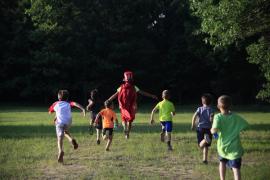On Friday, May 27, the Centers for Disease Control and Prevention (CDC) issued updated guidance for day and overnight camps. This updated guidance aligns strongly with the safety protocols and layers of protection discussed in the recent Town Hall Meetings that ACA hosted with the CDC and the Alliance for Camp Health. ACA encourages all camp operators to review this updated guidance and make any necessary adjustments to their COVID protocols for this summer to protect the health of campers and staff and ensure the least amount of program disruptions or cancellations.
The guidance has been issued in three related documents:
- K-12 and ECE Updated Guidance – outlines the updated guidance that applies not only to school settings, but also to camps, as well as out-of-school-time and other similar youth programs.
- K-12 and ECE Frequently Asked Questions Resource – answers the most frequent questions about the updated guidance and, toward the end of the document, includes information specific to the application of this guidance in a camp setting.
- Camp Frequently Asked Questions Resource – outlines specific considerations for an overnight camp setting, recognizing that the structure of overnight camps provides the opportunity for additional control over safety protocols.
This updated guidance provides camps with some new insights that may impact day and overnight camp communities differently. Some key aspects include:
Definition of Vaccination Status. The CDC has used a three-tiered COVID-19 vaccination status:
- Up to date (with all eligible boosters)
- Fully vaccinated (having completed the primary series)
- Not vaccinated.
Vaccination status has important implications for who needs to quarantine when exposed to a case of COVID-19. Additionally, up-to-date status now applies to all ages five and older, who are now eligible for boosters. Please read below for information on how vaccination status determines quarantine at this time.
Vaccination Status, Isolation, and Quarantine. It is important to note that all campers and staff who test positive for COVID-19 must isolate, regardless of vaccination status. Additionally, note that attendees who are not up to date on COVID-19 vaccines need to quarantine after exposure, while those up to date on COVID-19 vaccines do not need to quarantine (but should wear a well-fitting mask for 10 days and get tested). Camp directors should take time to carefully review quarantine and isolation recommendations to understand their implications for camp attendees.
Day Camps and Test to Stay (TTS). TTS can help keep exposed attendees, who would otherwise need to quarantine, in the camp program by combining contact tracing and serial testing (testing that is repeated at least twice during a seven-day period after the last close contact with a person with COVID-19), as long as they do not test positive for or exhibit symptoms of COVID-19. Camps may consider TTS to keep asymptomatic, camp-associated close contacts in the camp experience as an alternative to traditional quarantine at home. Day camps should review support materials such as the Operational Guidance for K-12 School and Early Care and Education Program guidance, as well as other CDC tools that cover testing in schools for guidance on TTS. Remember, camp attendees who are positive for COVID-19 must isolate from the camp program per isolation guidelines.
Overnight Camps and Quarantine. Overnight camps should isolate attendees who test positive for COVID-19, according to the FAQs released today. Many overnight camps subsequently ask, “What about staff and campers who are exposed to positive cases?” “How should they quarantine, especially in light of living together in bunks?” “Do I need to quarantine attendees separately based on their vaccination status?”
The use of cohorts in camps allows us to define a “family unit” that may be a mixture of up-to-date and not-up-to-date attendees. Attendees, regardless of vaccination status, may quarantine within their cohort. This is because up-to-date cohort members do not need to quarantine and thus may stay within the cohort with their not-up-to-date cohort members.
If you have questions about this revised guidance, please submit them using this form. ACA will compile these questions and work with the CDC to get answers that we can provide for the benefit of all camps.
Photo courtesy of Camp Courage USA in Owasso, OK.
The views and opinions expressed by contributors are their own and do not necessarily reflect the views of the American Camp Association or ACA employees.




